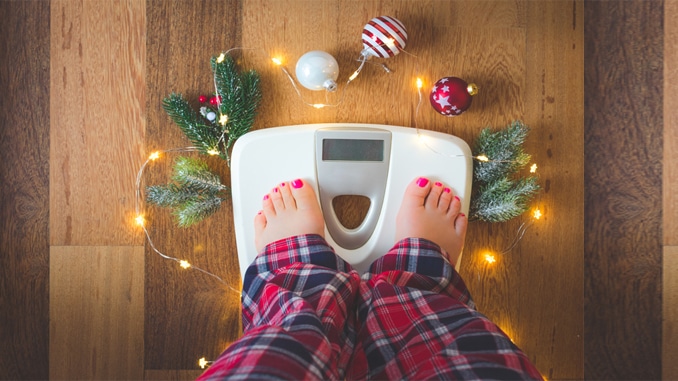
If you suspect that you gain weight during the holidays, you’re probably right. Scientists have found that we tend to pack on the pounds while celebrating and, unfortunately, fail to lose them in the months that follow.
If you want to maintain your figure this year, we’ve got 10 tips to help you stay lean and healthy this holiday.
Why Do We Gain Weight During the Holidays?
Weight gain is easy over the holidays for a few reasons. First, there are all those delectable foods, which encourage overeating. Then, there’s the cold weather, which discourages exercise, and stress, which can cause us to neglect our usual healthy routines.
In a 2000 study, researchers weighed about 200 adults four times, each time about six to eight weeks apart:
- Preholiday: From late September to mid-November
- Holiday: From November to January
- Post-holiday: From January to March
- Final: The following September
Results showed that compared to their September weight, participants gained weight by their March measurement. Between March and the following September, there was no significant weight change. The researchers concluded that the weight gained during the holidays was not lost the following spring or summer, which could explain the gradual increase in body weight that typically occurs as individuals age.
Other research has found similar results. After analyzing data from nearly 3,000 participants in three different countries — the United States, Germany, and Japan — scientists found that in all three, weight increased within 10 days after Christmas Day, compared with the 10 days before.
Significant weight gain was also observed around other major holidays, including the Easter Holiday in Germany, the Golden Week in Japan and Thanksgiving in the U.S. As before, although some of the weight was lost after the holidays, much of it stuck until the summer months and beyond.
10 Tips to Stay Lean and Healthy During the Holidays
You may believe that trying to avoid holiday weight gain means putting a damper on your enjoyment, but that doesn’t have to be the case. Here are 10 ways to make sure you stay lean and healthy while still taking in all the holidays have to offer.
1. Exercise in the Morning
Rather than focus on how much you’re eating, try focusing on your exercise instead. Head out first thing in the morning on an empty stomach to speed weight loss and boost energy levels. Early exercise primes the metabolism and keeps it burning all day long, which can help you get rid of those calories you’re going to eat.
Exercising on an empty stomach also encourages the body to use its fat reserves for fuel and can increases exposure to sunlight, which is known to be helpful in maintaining a healthy weight.
2. Get Enough Sleep
Avoid Holiday Weight Gain: Sleep deprivation messes with your hunger and satiety hormones and can cause you to crave carbohydrates and sweets. In a 2006 study of about 68,000 women during a period of 16 years, researchers found that those sleeping seven to eight hours a night had the lowest risk for major weight gain. Those sleeping six hours were 12 percent more likely to gain about 33 pounds during the study period, and those sleeping five hours or less were 32 percent more likely to gain that much.
Try to get the recommended seven to eight hours a night no matter what. Exercising every day will help as will keeping technology like computers, tablets, and cellphones out of the bedroom.
3. Relax
Avoid Holiday Weight Gain: The holidays are supposed to be a time when people relax but, unfortunately, they are frequently stressful, and stress has been linked with weight gain. After analyzing health data from about 2,500 men and women age 54 and older, researchers found that higher levels of the stress hormone cortisol were linked with being overweight. Other studies have found similar results — when we’re stressed, the body releases cortisol and cortisol encourages fat storage.
In addition, it’s easy to overeat or indulge in “comfort foods” when chronically stressed. So, it’s important to keep a lid on any stressful experiences. The best way is to schedule a stress-relieving activity each day. Exercise works well as does journaling, long walks, time with a pet, meditation, yoga, and crafting.
4. Keep Checking the Scale
You may want to ignore any indication that you may be getting a little heavier, but finding out sooner rather than later is the best way to avoid holiday weight gain. In fact, weighing yourself every day is a good way to keep your weight where you want it to be.
In 2017, researchers reported that those participants who stepped onto their scales every day during a two-year period experienced a drop in both body mass index (BMI) and body fat compared to those who didn’t. This worked whether the participants were trying to lose weight or not.
5. Avoid Alcohol Most Days
The holidays are a time when most people consume more alcohol, which is one of the reasons why weight gain occurs. Alcohol encourages weight gain in a number of ways, including the following:
- Many holiday specialty drinks are loaded with sugar and calories
- The body burns alcohol for energy before anything else, leaving your meal to be stored as fat
- Alcohol contributes to belly fat
- Alcohol lowers inhibitions, preventing you from making smart decisions about what you’re eating
- Alcohol encourages increased food intake; in a 2017 animal study, researchers found that subjects given alcohol over a period of three days significantly increased their food intake, suggesting that alcohol triggers hunger
- Alcohol creates a restless sleep
You can still enjoy your favorite drinks. Choose to do so on only two or three days of the week and abstain the rest of the time. You can also ask for drinks that are less likely to contribute to weight gain — see our previous post, “Popular Holiday Drinks to Avoid, and 5 Healthier Alternatives.”
6. Enjoy Only the Foods You Love
When you go to a friend’s house or even a family member’s place for a holiday meal, you may feel like you have to try everything, but that’s likely to increase your chances of eating too much.
The holidays are a time to enjoy, so take your favorites and leave the rest. You can always compliment the cook on the foods you ate. Do the same at a party — avoid the foods you feel lukewarm about and indulge in those you like.
7. Don’t Arrive Hungry
There is the idea that if you starve yourself before a big meal, you can indulge more, but the body doesn’t work that way. When you arrive at a party or meal feeling famished, you eat too much. You’re likely to eat quickly before your brain has time to register that you’re full. That will leave you feeling guilty a few minutes later, and you may have a bad case of indigestion too.
Keep a few healthy snacks around the house you can turn to when needed to curb that driving hunger, and then eat as usual at meal times.
8. Find More Ways to Move
Even when you’re not exercising, you can burn calories by moving more throughout your day. Take the family on a walk, shovel some snow, clean up the dishes, and volunteer to help however you can.
Whenever you do anything besides sit, you employ non-exercise activity thermogenesis (NEAT), which is the energy you expend when you’re not exercising. The more you move, the more calories you burn, which can offset any extra calories you may take in.
9. Drink More Water
Water helps you feel full and can keep you from overeating. It also helps boost your metabolism, encouraging the body to burn more calories after you drink. In one 2006 study, for example, researchers found that metabolic rate increased by 30 percent after participants drank a glass of water.
Try choosing water for your beverage most of the time. According to a 2005 study, those who did so consumed 194 fewer calories per day.
10. Distracting Yourself with Something Else That’s Fun
Sometimes, overeating occurs simply because a person is bored, standing around where food is available or looking for something to do with his or her hands. Most holiday events include food, and it’s easy to turn to eat as something to do.
There are many other possible fun activities, however. Eating is fun, but so is playing a game with family and friends, working on a craft, creating something new, making a snowman, going sledding or ice skating and many other things.
Anytime you choose to do something else rather than eat, you’re tapping into the power of distraction, which studies have shown is a more powerful ally than willpower when it comes to avoiding weight gain.
The best way to distract yourself from tasty treats is to do something else you enjoy. Watch a movie, listen to some music or pull up some funny videos. If you plan your distractions ahead of time, your efforts will be even more successful.
If you want to keep your heart healthy, get fit, feel great, and even lose weight, then check out the Cardio For Those Who Hate Cardio program, here!






